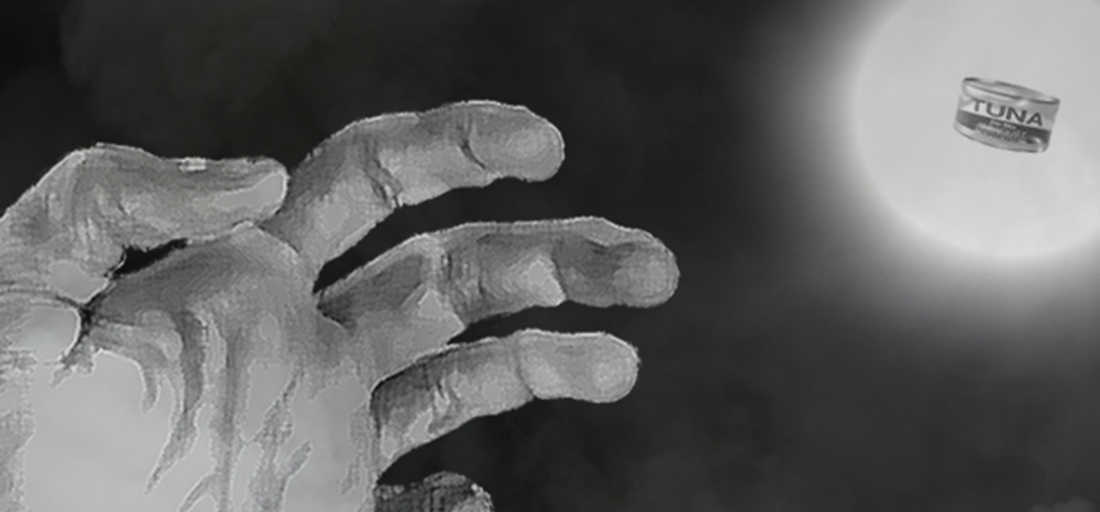
Introducing the Reader’s new feature, “Writers’ Recipes,” where we share personal recipes from famous authors. Installment one is Samuel Beckett’s recipe for “One Tuna Sandwich.”
✖
1) A voice comes to you in the dark. Imagine.
To you searching for lunch in the dark. Only a small part of what is said can be verified. As for example when you hear, You first saw the tuna in your kitchen on such and such a day. Then you must acknowledge the truth of what is said. But by far the greater part of what is said cannot be verified. As for example when you hear, Now it is to be placed between bread. Sometimes the two are combined as for example, You first saw the tuna in your kitchen on such and such a day and now it is to be placed between bread. A device perhaps for the incontrovertibility of the one to win credence for the other. That then is the proposition. Perhaps the result is a sandwich. This much being unknown.
2) The voice comes to you now from one quarter and now from another. Now faint from afar and now a murmur in your cupboard. Can you move? Do you move? Should you move? Crawl. Fall. Lie in dark with closed eyes resting from your crawl. Perhaps saying to yourself, Why eat at all? Why not just lie in the dark with closed eyes and give up? Give up lunch. Have done with the sandwich. But little by little as you lie the craving for lunch revives. The need to hear that voice again. If only saying again, You are searching for lunch in the dark. Or as for example, You find the can of tuna by the light of dim shine on its round parts and how the dark changes when the tuna passes below or above the eyes. Then you must wonder. What in the world can be making that alien smell. How much more companionable could his creator but smell. Some sixth sense? Inexplicable premonition of impending lunch? Yes or no? No. Pure reason? Beyond experience. God is love. Yes or no? No.
3) You find the can of tuna on such and such a day and now it is to be placed between bread. And the can opener? Where is it? As a younger man on Langhorne’s Freight you witness trout left rotting on the bow, a catch spoilt. With eyes wet from the stench of necrotic flesh you gaze on the long waters. How the sun appeared above the crest of the rise. How upon returning to port the men and women were low as buried clay. Now searching through past pictures. See the can opener concealed. See the can opener in another darkness or the same. Look longer and see the task turn to dust, forgotten as such.
4) All this business of a labor to accomplish, before you can end. Of an imposed lunch . The question now being not the place of the can opener but of the method second best to the previous. Grope in darkness for the items at the long length of your arm. There is a scout-knife and something wooden. There are secateurs, rusted shut. There is a metal fork. Quick seize the fork where it is best seized. For good and all. For poor best worse and all.
5) The fork to open. To jab the can in darkness. Soon no can to open? No. You stand with your back to the table. No sound but your hungering pant. Ever fainter as it slowly ebbs. Till it slowly increases in volume again. You lean on the long fork again. A few small jabs downward. But pausing now. You used to never halt except to make your start. So you jab again save perhaps a moment to paw for your can in darkness. To gather yourself together for the start. And you do. As never before. You jab again. And you are no older now than you always were. And yet halt opening as never before. The punctures obscured in smallness. No can left unopened. And yet you cannot open. The bread loaf isolated elsewhere and the tuna caged within. You set down to your knees.
6) The can is closed. It makes no sound. Today nor any other day will the sandwich come to be made. So in the dark now squatting and now supine you toil in vain. And just as from the former position to the latter the shift grows easier in time and more alacritous so from the latter to the former the reverse is true. Till from the occasional relief it was supineness becomes habitual and finally the rule. You now on your back in the dark shall not rise to your arse again to clasp your legs in your arms and bow down your head till it can bow down no further. But with face upturned for good labour in vain at the fable of your sandwich. And how the fable too. The fable of you in the dark with a sandwich. The fable of one fabling with you in the dark of a sandwich. And how better in the end labour lost and silence. And you as you always were.
Alone.
✖

